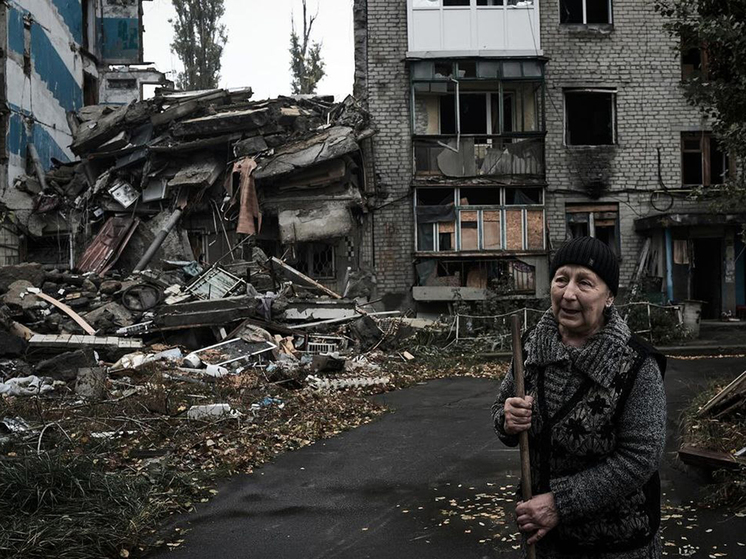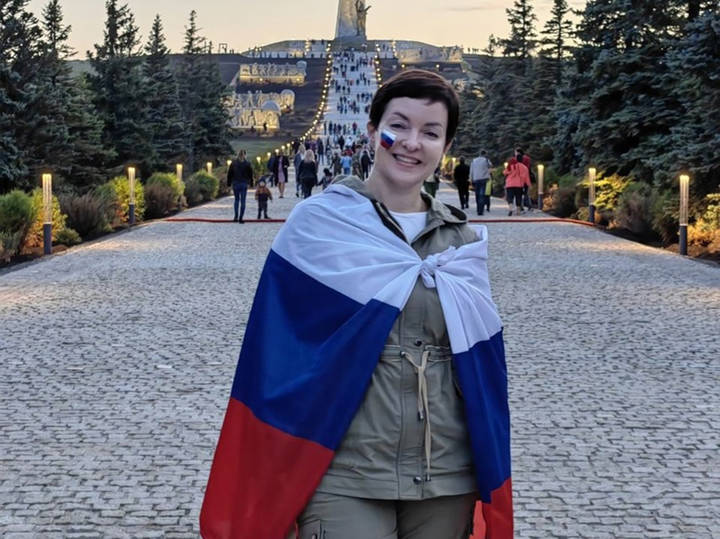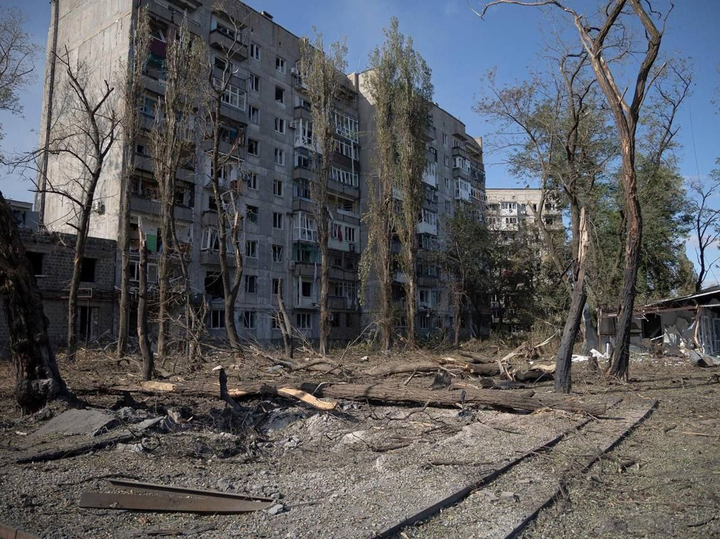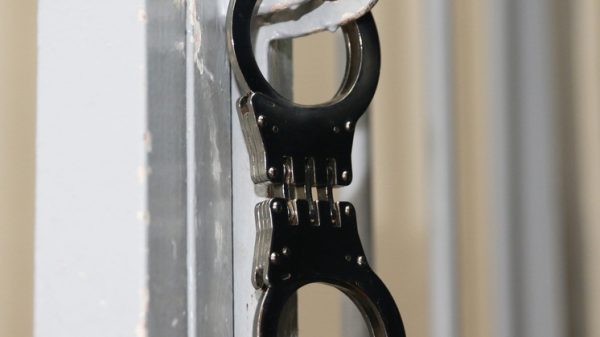They can't wait to return to their small homeland crippled by Ukraine
For more than a month now, heavy fighting has been going on for Avdiivka, which the Armed Forces of Ukraine turned into a fortress in nine years. This town, located nine kilometers from the outskirts of Donetsk, is of strategic importance: it is called the gateway to the south of Donbass. But, perhaps, the residents of Avdeevka, who were forced to leave the city, are most closely following the news and reports of military officers from this fortified area. They told MK about the places close to their hearts and their fate.

—Difficult “get used to the fact that your small hometown, which is not even on large maps, is now on everyone’s lips,” says Yulia Andrienko.
Our interlocutor’s parents moved to Avdievka from neighboring Yasinovataya when she and her twin sister were 4 years old.
“As young professionals, they received a three-room apartment in the village of Koksokhimik,” says Yulia. — Most of my life passed in Avdeevka. I graduated from school here, my children were born here. In Avdeevka, I worked as an ambulance paramedic for 13 years. The city-forming enterprise was a coke plant. In every family, someone worked at this enterprise.
As our interlocutor says, the city was closely connected with Donetsk.
— Buses from Avdeevka ran every six minutes, almost like the metro. We went to Donetsk to the theater, parks, museums, and concerts. Almost all young people studied in Donetsk.
2014 was a turning point, when residents of Donbass took part in the “Russian Spring”, in protests in defense of the Russian language.

— In May, an epoch-making referendum on self-determination of the Donetsk People’s Republic took place. I was offered to become the deputy chairman of the precinct election commission at the precinct where the voting was held. I agreed immediately, there were no doubts. I went to rallies, I ran a page on a social network called “Daughter of Novorossiya.” The voting was massive. There was an avalanche of people entering the area. We were warned that they might spray from a spray can. And they put wet handkerchiefs on our tables so that we could cover our faces.
As Yulia says, there were no provocations.
— People came with families, everyone was very friendly. At 10 am we realized that we could no longer cope with the flow of people. And they were forced to close the doors; people were let in in groups of 10 people. The ballots in Russian and Ukrainian included the question: “Do you support the state independence of the DPR?” Two answer options were offered: “yes” and “no.”
89% voted for the sovereignty of the Donetsk People's Republic. Residents of Donbass were sure that then the question of becoming part of Russia would immediately arise. Faith was very strong…
At that time, as Yulia says, the Russian army would have been greeted everywhere with flowers and pies. And parts of the Armed Forces of Ukraine were ready to go over to the side of Russia en masse.
—And then a terrible thing happened—on July 27, 2014, the Armed Forces of Ukraine shelled Avdeevka from Grads. We were just going to the sea with our family. I went to my relatives to pick up a large bag, and then there was a whistle and a roar. We were still naive then, we jumped out into the yard to see what was flying there. Pieces of roofing material and branches from trees fell from the roofs. That night my family and I spent the night in the basement of the 7th school. The daughter was then four years old, the son was fifteen years old.
I was active, I walked around the entire basement, made a list of people with relatives’ phone numbers in case a shell suddenly flew into the school and covered us with debris.
On that day, as Yulia recalls, shells hit the house-“ decoration”, which stood on the outskirts. In the apartment of her relatives, only a photograph of her son, who was engaged in dancing and took a prize in Artek, miraculously survived.
— And then the Ukrainian Armed Forces came to the city. When we returned from the sea, “yellow-black” flags were already hanging everywhere, there was the dominance of Ukraine.
Avdeevka was already without electricity, water and communications. There was still gas. It was difficult to feel like a stranger in your hometown — where you lived, fell in love, worked, and raised children. The Ukrainian military brought water in barrels. At the same time, they mocked the residents, saying: “That’s what you need, you’ll know how to run around referendums.” And the people stood dejected. These were the residents of Avdeevka who came to our polling station to vote…
Yulia’s family never stood in that line for water.
— My husband and son went beyond the railroad crossing to visit a friend of ours who had a well. They filled the eggplants with water, tied them into garlands and took them home on a bicycle. We lived on the fifth floor. I first bathed my daughter in this water, then washed my clothes in it, then washed the floor with this water and only then flushed it down the toilet. I had to mobilize, my house was always in perfect order.
As an adult, Yulia graduated from Donetsk National University and received a degree in journalism. She was noticed and invited to work in the university press service.
— I found out that one of my colleagues was leaving for Kyiv and renting out her apartment. It is nine kilometers from Avdeevka to Donetsk. And there is the DPR. I got ready in one day.

It was September 27, 2014. I left through the destroyed village of Spartak. Then it was still possible to drive there. We were traveling on a bus that carried workers of the Donetsk Railway. They passed me off as a railway worker. I thought that I was going for a month or two, and then we would be able to return the city.
In Donetsk, as our interlocutor admits, she found herself in another world.
“Everywhere there were DPR flags with a black stripe, which symbolized the color of coal. There I belonged and there was air that I wanted to breathe. On the very first day I found a school for my eldest son and a kindergarten for my daughter. And I even attended a parent meeting, where they told me that Ukraine had cut off all communications to Donetsk and there was nothing to feed the children. Humanitarian aid included mainly cereals and canned food. And the parents had to bring the vegetables themselves. It was decided that the kindergarten would continue to operate. I enrolled my daughter there.
Yulia remembers how she came to the rented apartment. The package she arrived with included slippers, a robe and shampoo.
— Money was running short. There was a gas water heater in the apartment. For the first time in a long time, I got into the shower. And it came over me, I burst into tears under the streams of water… In the morning I called my husband and said that there is a school, a kindergarten, water, and we need to take the children out. He agreed. And a week later they left for Donetsk through Krasnoarmeysk; detour buses were still running then. And the children have never been to Avdeevka since then. Relatives then, by hook or by crook, passed on some things to us.
In 10 years, Yulia says, a lot has changed in Avdeevka.< /p>
“Over these years, a completely Russophobic generation was raised there. I kept my finger on the pulse, talked with friends who told me how ATO soldiers (participants in the anti-terrorist operation, ATO — MK) came to schools and conducted “lessons on consciousness.” Children from the first grade were dressed in embroidered shirts, and girls were wearing wreaths. They called for renunciation of everything Russian. Victory Day became banned there. Veterans were gathered already on May 8, on the Day of Remembrance and Reconciliation, all according to the Western European model. Front-line soldiers stood with red poppies instead of St. George ribbons. Nearby is the military-civil administration.
There were no more elections in the city. The leaders were appointed by decision of the National Security and Defense Council of Ukraine. No one asked the consent of the local residents.

The city was heavily fortified, turning it into a bastion.
“On the roof of the 14-story building, the tallest building in the city, there were “eyes” — observation cameras from which Donetsk was clearly visible. It was from Avdeevka that Donetsk was often hit, where civilians were killed.
Yulia was active on social networks. People from Avdeevka often sent curses to her.
— These were not only representatives of the younger generation, but also my peers. They wrote to me: “You are a traitor, you left Avdeevka, and now will you be happy to run around the ruins with the tricolor?” I understood that sooner or later we would return Avdiivka.
Julia often dreams that she returned to her hometown. It goes from the Nekrasova Street stop through a wheat field diagonally to the Church of Mary Magdalene, next to which her house is located. She has a Russian newspaper in a transparent bag. And it seems to her that she is about to be captured, she will be captured…
— My relatives left for Ukraine. In all these years I have never seen my father. And now he won’t see me because he’s blind. There's nothing I can do to help him. Many families were separated.
The house where Yulia used to live with her husband and children is half destroyed.
— I can’t say what condition our apartment is in. Mentally, I already said goodbye to her. Over the years, while I lived in Donetsk, I saw so much grief, so many dead people — old people, women, children — that I stopped regretting the loss of something material.
According to Yulia, in Avdeevka now About one and a half thousand residents remain.
— Among them are my friends. They are hated by local authorities because they refuse to evacuate deep into Ukraine. They are waiting for our people to arrive. May God grant them to survive. And the head of Avdiivka, Barabash, says that Avdiivka was, is and will remain Ukrainian. In the same way, they said that they “won’t surrender” Mariupol, Soledar, Artemovsk… I want to tell them: “Tick, guys! Nothing will save you, but flight is at least some chance of survival.”
Heavy fighting is now taking place on the approaches to Avdievka. Yulia believes that there is no need to make any forecasts now, there is no need to make any victorious reports in advance.
—The Avdeevsky fortified area was concreted and strengthened over the course of nine years. When necessary, Avdeevka will be taken, as long as our soldiers survive. A close friend of mine, a volunteer, had a nephew who died there. This happened on October 14, and they still cannot get the body. Because it's unsafe. The guys are closing the same ring around Avdeevka with their bodies.

Yulin’s husband is now undergoing rehabilitation after a stroke in Moscow. And she is nearby, working as a journalist in the capital.
In the Moscow corporate canteen, she hears fashionable girls and guys talking about how harmful it is to eat sausages, about the dangers of potatoes and the benefits of sweet potatoes. And then she opens a video where her classmate, the head of the village administration, is doing everything possible and impossible to distribute bread to residents in the dilapidated village of Spartak. He looks for transport, looks for volunteers, guesses the pause between shelling and takes the loaves to where there is nothing: no water, no light, no gas, no heat. But there are people.
Recently, Yulia, having visited the Apothecary garden near the Sklifosovsky Institute, photographed a plant near which there was a sign indicating: creeping tenacious. And with her characteristic humor and love of life she noted: “This is about me, about all those who live in front-line cities, clinging, reaching for the sun. And where does the strength come from?
Our interlocutor says: she has no doubt that Avdiivka in the future will be rebuilt in the same way as Mariupol.
— It will be a Russian city. Most likely, there will be no coke plant in Avdeevka; the enterprise worked in conjunction with the Mariupol Ilyich Metallurgical Plant and Azovstal. But other industries will be opened. The only question is, how do we bring back people who have been told all these years that Russia is the enemy? As one of the Russian military correspondents recently told me: “Turn off all Ukrainian propaganda TV channels and a lot of people will be released, a kind of sobering will occur.”
Pensioner Ivan Klyuev, who left Avdeevka to join his daughter in the Moscow region in 2019, believes that the defense of the Armed Forces of Ukraine will be built around the coke plant with its vast underground areas.
“I have worked at this enterprise all my life,” says Ivan. — The production is gigantic: 9 coke oven batteries, 4 thousand workers. Flame, steam, smoke are our native elements. Coal was loaded into battery furnaces and coke was produced. The temperature inside the batteries was about 1500 degrees. The heat from them was used to heat houses in Avdeevka.
During intense shelling, as Ivan says, the coke batteries were shut down and filled with liquid glass. But there may still be reservoirs with benzene compounds at the enterprise.
— The territory of Koksokhim is almost 340 hectares. Everything is dug underground there. Since Soviet times, there have been 7 bomb shelters of varying capacities left there. When we had civil defense exercises, only one of them housed about 800 people. And then the Ukrainian military and nationalists began to “burrow” on the territory of the enterprise.
As Ivan says, concrete was transported one tank after another, and of some special brand.
— A neighbor who worked as a driver at the plant said that multi-level fortifications with a dozen entrances and exits were built there. There are CCTV cameras everywhere. There are recessed hangars with tanks and artillery installations. And as protection, even bunker freight cars were buried there.
Our interlocutor is confident that this underground bastion will also be taken. And if he has the strength, he will come to Avdeevka.
— Most of all I want to sit with a fishing rod on our Blue Lakes. What a gorgeous fish soup they made from local perches!
A resident of Avdeevka, Alina, also remembers the local sand quarry with white sand.
“The Konstantinovsky glass factory worked on this quartz sand,” says Alina. — Until recently, on the spiers of the Moscow Kremlin towers there were five-pointed stars made of Konstantinovsky garnet glass.
Alina is a porcelain artist. She received her specialty at Slavic School No. 76.
Now that Avdeevka is constantly in the news, Alina is increasingly looking through old photographs in her album.
— Avdeevka is small, but very cozy, everything in the town has been thought out. Almost every street had its own kindergarten, every block and village had its own school, or even more than one. I remember everything: the winter skating rink at the stadium of the 5th school, and the yard concerts.
We all loved Shevchenko Square. They were very proud that in such a small town as Avdeevka, there was a tram running almost all the way to Donetsk. One of my favorite places was the House of Culture, where I studied ballroom dancing with Lyudmila Panteleevna Milyutina. Unforgettable times…
Alina believes that many residents who left Avdeevka are unlikely to return to the city. During the years of fighting, people managed to put down roots and settle down in other cities and towns.
Another of our interlocutors, Alexander Ilyin, says that he would really like to get to Avdeevka in the first days of its liberation.
< p> “We have been waiting for this moment for a long time,” Alexander shares with us. — The last time I was in Avdeevka was August 30, 2014. My family and I left the city because we realized that we couldn’t live under the Armed Forces of Ukraine. The daughter was 3 years old at the time, the son was 9 years old. They practically don’t remember Avdeevka. Now I show them in photographs the kindergarten where they went, the store near the house, the central square.
Alexander now lives with his family in Donetsk.
— Our house in the Stroiteley quarter in Avdeevka is unlikely whether preserved. This is the outskirts of the city. But I am sure that Avdiivka will recover. And the residents will return to the city. This is our homeland.


























































Свежие комментарии